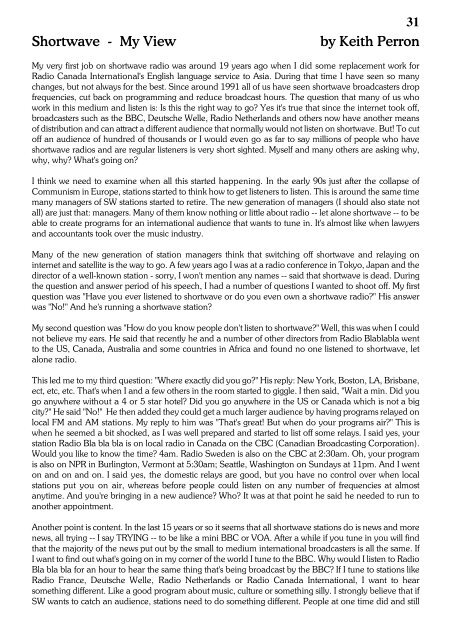6 - 2009 - Archive copies of DX MAGAZINE - wwdxc
6 - 2009 - Archive copies of DX MAGAZINE - wwdxc
6 - 2009 - Archive copies of DX MAGAZINE - wwdxc
You also want an ePaper? Increase the reach of your titles
YUMPU automatically turns print PDFs into web optimized ePapers that Google loves.
Shortwave - My View<br />
31<br />
by Keith Perron<br />
My very first job on shortwave radio was around 19 years ago when I did some replacement work for<br />
Radio Canada International's English language service to Asia. During that time I have seen so many<br />
changes, but not always for the best. Since around 1991 all <strong>of</strong> us have seen shortwave broadcasters drop<br />
frequencies, cut back on programming and reduce broadcast hours. The question that many <strong>of</strong> us who<br />
work in this medium and listen is: Is this the right way to go Yes it's true that since the internet took <strong>of</strong>f,<br />
broadcasters such as the BBC, Deutsche Welle, Radio Netherlands and others now have another means<br />
<strong>of</strong> distribution and can attract a different audience that normally would not listen on shortwave. But! To cut<br />
<strong>of</strong>f an audience <strong>of</strong> hundred <strong>of</strong> thousands or I would even go as far to say millions <strong>of</strong> people who have<br />
shortwave radios and are regular listeners is very short sighted. Myself and many others are asking why,<br />
why, why What's going on<br />
I think we need to examine when all this started happening. In the early 90s just after the collapse <strong>of</strong><br />
Communism in Europe, stations started to think how to get listeners to listen. This is around the same time<br />
many managers <strong>of</strong> SW stations started to retire. The new generation <strong>of</strong> managers (I should also state not<br />
all) are just that: managers. Many <strong>of</strong> them know nothing or little about radio -- let alone shortwave -- to be<br />
able to create programs for an international audience that wants to tune in. It's almost like when lawyers<br />
and accountants took over the music industry.<br />
Many <strong>of</strong> the new generation <strong>of</strong> station managers think that switching <strong>of</strong>f shortwave and relaying on<br />
internet and satellite is the way to go. A few years ago I was at a radio conference in Tokyo, Japan and the<br />
director <strong>of</strong> a well-known station - sorry, I won't mention any names -- said that shortwave is dead. During<br />
the question and answer period <strong>of</strong> his speech, I had a number <strong>of</strong> questions I wanted to shoot <strong>of</strong>f. My first<br />
question was "Have you ever listened to shortwave or do you even own a shortwave radio" His answer<br />
was "No!" And he's running a shortwave station<br />
My second question was "How do you know people don't listen to shortwave" Well, this was when I could<br />
not believe my ears. He said that recently he and a number <strong>of</strong> other directors from Radio Blablabla went<br />
to the US, Canada, Australia and some countries in Africa and found no one listened to shortwave, let<br />
alone radio.<br />
This led me to my third question: "Where exactly did you go" His reply: New York, Boston, LA, Brisbane,<br />
ect, etc, etc. That's when I and a few others in the room started to giggle. I then said, "Wait a min. Did you<br />
go anywhere without a 4 or 5 star hotel Did you go anywhere in the US or Canada which is not a big<br />
city" He said "No!" He then added they could get a much larger audience by having programs relayed on<br />
local FM and AM stations. My reply to him was "That's great! But when do your programs air" This is<br />
when he seemed a bit shocked, as I was well prepared and started to list <strong>of</strong>f some relays. I said yes, your<br />
station Radio Bla bla bla is on local radio in Canada on the CBC (Canadian Broadcasting Corporation).<br />
Would you like to know the time 4am. Radio Sweden is also on the CBC at 2:30am. Oh, your program<br />
is also on NPR in Burlington, Vermont at 5:30am; Seattle, Washington on Sundays at 11pm. And I went<br />
on and on and on. I said yes, the domestic relays are good, but you have no control over when local<br />
stations put you on air, whereas before people could listen on any number <strong>of</strong> frequencies at almost<br />
anytime. And you're bringing in a new audience Who It was at that point he said he needed to run to<br />
another appointment.<br />
Another point is content. In the last 15 years or so it seems that all shortwave stations do is news and more<br />
news, all trying -- I say TRYING -- to be like a mini BBC or VOA. After a while if you tune in you will find<br />
that the majority <strong>of</strong> the news put out by the small to medium international broadcasters is all the same. If<br />
I want to find out what's going on in my corner <strong>of</strong> the world I tune to the BBC. Why would I listen to Radio<br />
Bla bla bla for an hour to hear the same thing that's being broadcast by the BBC If I tune to stations like<br />
Radio France, Deutsche Welle, Radio Netherlands or Radio Canada International, I want to hear<br />
something different. Like a good program about music, culture or something silly. I strongly believe that if<br />
SW wants to catch an audience, stations need to do something different. People at one time did and still
















